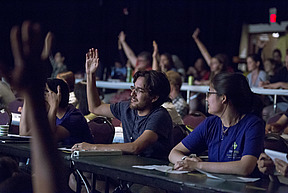
PCMI 2025 Undergraduate Summer School
The Undergraduate Summer School (USS) at PCMI provides a unique opportunity for undergraduate students to learn some fascinating mathematical ideas in a setting that allows them to interact with mathematicians at all levels. The program itself is typically centered around lecture series delivered by leading experts on topics related to the main research theme of PCMI that summer. These lectures generally present material not usually part of an undergraduate curriculum, allowing students to become familiar with key ideas and techniques in the field, and often leading toward further research. The program is structured so that students at different levels will have many opportunities to learn new things.
The USS is not like a typical REU in several ways. The focus of the USS is more on the specialized lecture series and most importantly, the ability to interact informally with the many graduate students and researchers attending other parts of PCMI. Students can get to know mathematicians who have pursued a wide variety of career paths, and they can get a sense of which of these paths may be most appealing to them. Many USS participants report making connections that strongly influence their choice of graduate school. Interactions are fostered by the various informal social activities open to all PCMI participants, as well as daily "cross-program activities," which include lectures and presentations on topics of general mathematical interest. Members from all parts of PCMI may take part in the Experimental Math Lab, in which small groups of participants with close mentorship from a more senior mathematician investigate open-ended problems and report on their findings at the end of the three-week Summer Session.
The USS is open to undergraduate students at all levels, including those who have just completed their undergraduate studies. Participants are expected to be in residence for the entire three weeks of PCMI.
The PCMI Summer Session will be held July 6-26, 2025.
Research Theme: Extremal and Probabilistic Combinatorics
In 2025 there will be one daily lecture series at 1pm, given by Yuval Wigderson (ETH Zürich), and the morning sessions will involve experimental mathematics component with open-ended problems and computational work. Here is an outline of Dr. Wigderson's lectures:
Title: Extremal graph theory and Ramsey theory
Description:
How many edges can an n-vertex graph have if it doesn't contain a cycle?
- If we forbid all cycles, then the answer is n-1; this is a restatement of the well-known fact that every n-vertex tree has n-1 edges.
- If we forbid only the triangle C3, then the answer jumps up to ⌊n2/4⌋.
- If we forbid only the five-cycle C5, we (somewhat surprisingly) get the same answer of ⌊n2/4⌋. In fact, the same holds if we forbid C7, C9, or any other odd cycle.
- If we forbid the four-cycle C4, the answer is suddenly much smaller, on the order of n3/2. The proof of this result uses surprising connections to number theory and finite geometries; similar techniques can also be used to show that if we exclude C6, then the answer is on the order of n4/3.
- But if we forbid C8, then nobody knows the answer! This is one of the outstanding open problems in extremal graph theory.
Extremal graph theory and Ramsey theory are two of the central branches of modern extremal combinatorics, which seeks to understand the size and structure of discrete objects under certain natural constraints. In this course we will explore these topics, seeing both some of the beautiful techniques developed to study such problems, as well as many innocent-looking problems that seem completely out of reach of the currently-known techniques. We will also see some of the many connections these questions have to other areas of mathematics, including geometry, number theory, probability, and theoretical computer science.
Prerequisites: At least one course in combinatorics or graph theory.
All admitted students will be expected to contribute toward an inclusive and collegial atmosphere in this program. USS students come from many different backgrounds, and with different strengths, and we ask that all USS students commit to working together positively and noncompetitively.

